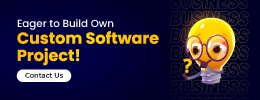How To Be A Full Stack Developer-Basic to Advance Guidebook
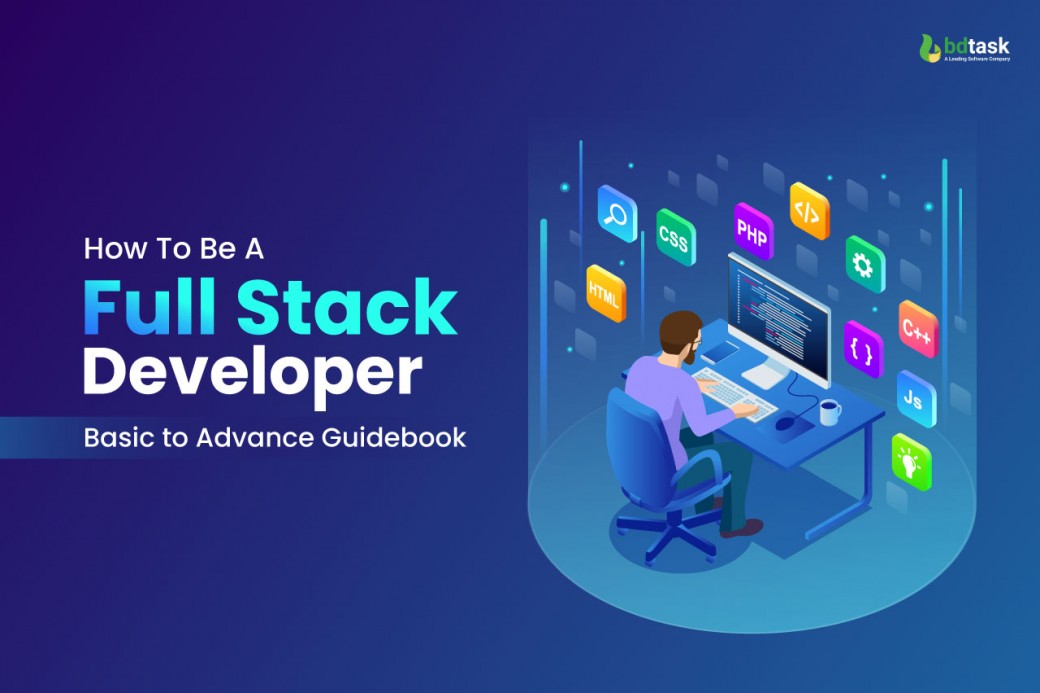
Becoming a full stack developer is an exciting journey that opens up a world of technological opportunities. But how to be a full stack developer?
Full stack developers are in high demand.
In today's rapidly evolving tech scenery, becoming a full stack developer has emerged as one of the most sought-after and rewarding career paths.
A full stack developer possesses the skills and knowledge to work with front-end and back-end technologies, making them versatile and valuable assets for any tech-driven organisation.
At some point, if anyone is interested in a career in full stack development but not know where to start, we are here to help.
We'll walk you through the steps to become a successful full stack developer, covering everything from skills you need to master to tips for advancing your career.
Before we get into what needs to become a full-stack developer, let's take a quiet look at who is a full-stack developer.
Let's Summing Up the Full Stack Developer Journey.
 If you want to build your career in software development then read this blog.
If you want to build your career in software development then read this blog.
Who Is A Full-Stack Developer-Lets Finds Out
Before learning how to be a full stack developer, people must know who is a full stack developer.
There are two classifications of web development.
- Front end
- Back end
----------------------------------------------------------------
Back end =Scenes covering APIs, servers, databases, and more
Front end =Design and Graphical interface.
----------------------------------------------------------------
Both are necessary for running any app or website. Full stack developers can use any coding language for their project requirements.JavaScript is a popular language frequently used by full-stack developers as it's one of the few languages that can be used both on the front and back end.
The Dual Nature of a Full Stack Developer
A full stack developer is a bridge between two distinct worlds. They create visually appealing and user-friendly interfaces on the front end using technologies like HTML, CSS, and JavaScript. They handle server setup, database management, and the application's logic on the back end.
__________________
Some popular languages are for front and back-end developers
Back end=Java, Python,Ruby, Node.js, PHP
Front end=HTML, CSS, JavaScript
__________________
Full stack developers handle the web applications' client-side (front-end) and server-side (back-end) aspects. It would be best to be well-versed in varies programming languages, frameworks, and tools to create powerful and dynamic web applications.
What Is A Full Stack Developer-Learn The Basics
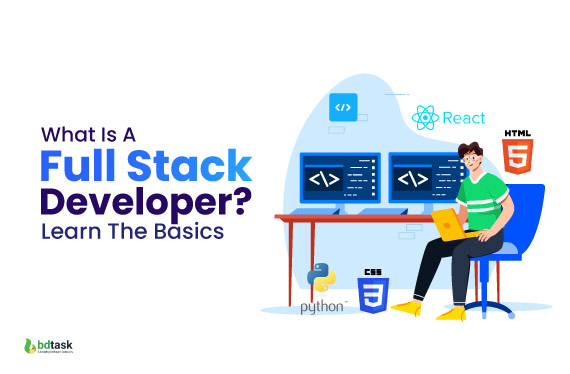
A full stack developer can work on both the Front-end and Back-end of web development, possessing a diverse skill set. Full stack developer design and create websites and applications for various platforms.
A full stack developer is an engineer capable of working on all aspects of software development.
The term "stack" directs to the layers of technology used to create a web application, including the user interface, server, and database.
Why Become A Full Stack Developer?
Becoming a full stack developer opens up a world of opportunities and doors. You can turn ideas into fully functional applications, work on many projects, and better understand the development process.
Whether you're interested in launching your startup or contributing to established companies, being a full stack developer gives you the flexibility to do it all.
In the next sections, we'll dive into the essential skills you need to master, the specifics of front-end and back-end development, the significance of APIs, version control, database management, server deployment, working with frameworks, and ultimately how to embark on a successful full stack developer journey.
__________________
Now its time to kick off the Q&A session
Q: What's the difference between back-end and front-end development?
A: Front-end focuses on the user interface and experience, while back-end handles server-side logic and data management.
__________________
How To Be A Full Stack Developer-Essentials Skills
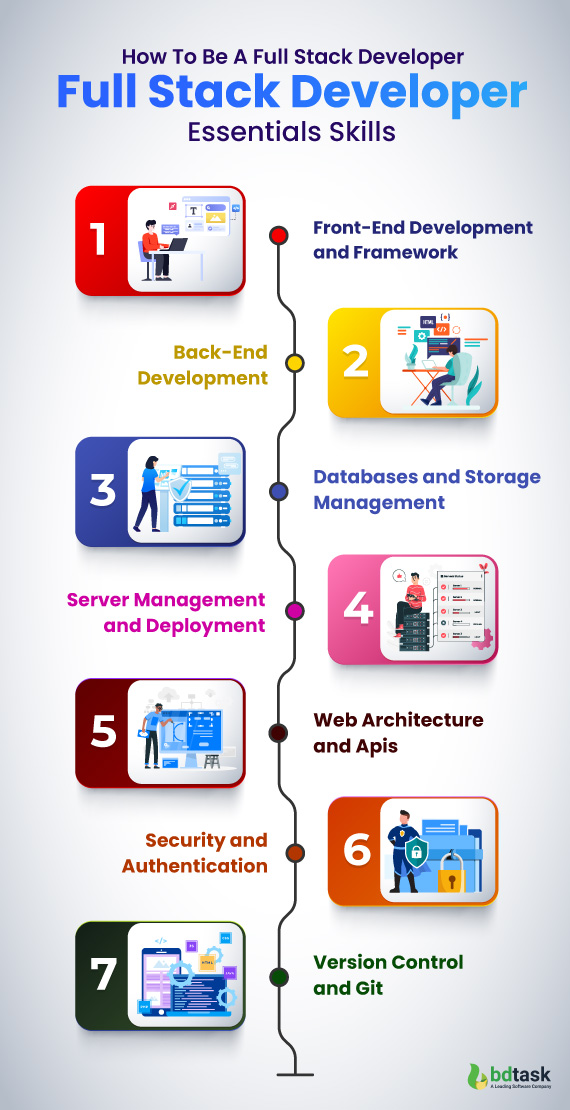
1. Front-End Development and Framework: Crafting User Interfaces
To become a full-stack developer, the first step from scratch is identifying which front-end developer stacks you should learn.
Front-end development focuses on creating visually appealing and user-friendly interfaces. It entails coding details like drop-down menus, fonts, colours, and page layouts.
You'll need to be proficient in HTML for structure, CSS for styling, and JavaScript for interactivity. Frameworks like React, Angular, or Vue.js will enhance your ability to build dynamic user interfaces.
2. Back-End Development: The Engine Behind the Scenes
Behind every great application is a powerful back-end that handles data storage, security, and application logic.
Full stack developers proficient in back-end development languages like Node.js, Django, or Ruby on Rails build the server-side components that make applications functional and dynamic. You can upgrade your skill through back-end development.
3. Databases and Storage Management
Storing and managing data effectively is crucial in any application. Full stack developers work with databases such as MySQL, PostgreSQL, or MongoDB to ensure data integrity and efficient retrieval. They design database schemas, optimise queries, and ensure the application's performance.
4. Server Management and Deployment
A full stack developer knows how to deploy applications on servers, ensuring they are accessible to users. They work with server management tools, handle hosting configurations, and address server-related issues to guarantee a seamless user experience.
5. Web Architecture And Apis
Understanding web architecture and APIs (Application Programming Interfaces) is essential for building robust applications. Full stack developers create APIs that enable communication between different application parts, ensuring data flow and interaction.
6. Security And Authentication
With the increasing importance of data security, full stack developers must implement authentication and authorisation mechanisms. They safeguard user data, prevent unauthorised access, and ensure compliance with security standards.
Q&A time
Can I become a full-stack developer?
A: yes you can and anyone can but follow some steps to achieve it worries we are here to help you.
7. Version Control and Git
Version control is essential for collaborative development. Git allows you to track changes, collaborate with others, and revert to previous versions if needed. Mastering Git will greatly enhance your efficiency as a developer.
#Note That Down#
As a full-stack developer, some of the following programming languages and tools you may be know
- Angular JS
- Apache HTTP Server
- AWS
- CSS
- Polymer
- React
- Ruby on Rails
- Vue.js
- MySQL
- Nginx
- Node.js
- PHP
- Ember.js
- JavaScript
- jQuery
- Laravel
- Microsoft SQL Server.
Q&A Time
Q: How do I stay updated with the latest industry trends as a full stack developer?
A: Follow Tech blogs, Online courses, and Attend conferences or meetups to stay informed.
How To Become A Full Stack Developer-9 Steps to Follow
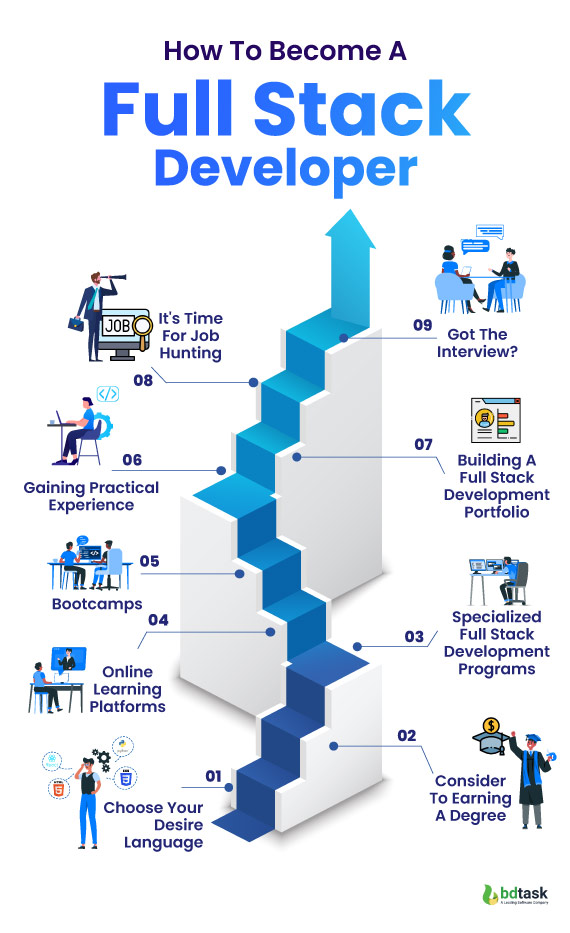
To begin your journey as a full stack developer, start by mastering the core technologies. Please familiarise yourself with HTML, CSS, and JavaScript, as they form the foundation of front-end development.
Understanding how to structure web pages, style them, and add interactivity through JavaScript will be crucial in your career as a full stack developer. let's learn how to be a full stack developer with some step.
let's see how to be a full stack developer step by step
1. Choose Your Desire Language
Before getting the idea of How To Be A Full Stack Developer, the whole cycle start with selecting the programming languages and technologies you want to specialise in. A typical tech stack might involve JavaScript, HTML/CSS for front end, and Python, Ruby, or Node.js for back-end development.
2. Consider To Earning A Degree
One conventional path to becoming a full stack developer is pursuing a degree in computer science or a related field. A formal education provides a structured learning environment where individuals can gain vase knowledge of algorithms, data structures, and programming languages.
##Point to be noted: This route can be time-consuming and expensive.##
3. Specialized Full Stack Development Programs
In recent years, universities and coding boot camps have introduced specialised programs focused on full stack development.
These intensive programs offer a condensed curriculum that covers the essential skills required for the role. They are designed to equip students with practical, job-ready skills in a shorter time than traditional degrees.
4. Online Learning Platforms-Self Thought Process
With the rise of online learning platforms, aspiring developers can learn full stack development independently.
Codecademy, Udemy, and Coursera offer courses covering various programming languages, frameworks, and tools. This self-paced approach allows flexible learning, catering to individuals with different schedules and commitments.
5. Bootcamps
Intensive coding boot camps provide focused training within a few months, immersing participants in real-world projects and coding challenges.
Q&A session
Q: How Long Does a Coding Bootcamp Take to Complete?
Coding boot camps generally handle full- or part-time schedules and last 3-6 months.
A full-time bootcamp= Runs for 12 weeks.
##Expect most part-time boot camps to run for 24 weeks with fewer weekly class hours.
Want to find out which full-stack coding boot camp is best for you so you can build a career in full-stack development? Then you're in the right place.
Here's our list of the best 8 full-stack development boot camps
- Bdtask
- Springboard
- BloomTech
- Nucamp
- KnowledgeHut
- Brainstation
- 4Geeks Academy
- Code Platoon
- Springboard's Software Engineering Bootcamp
By completing a boot camp, you'll have gained essential skills, developed an impressive coding portfolio, made some vital industry connections, and prepared yourself for the job hunt. We are not finished yet. Let's explore the rest of the steps, so be patient.
6. Gaining Practical Experience
When do all of the above, then it's essential to gain some practical skills like
- Internships
- Freelance work
- Contributing to open-source projects
- Attend meet up and conference
The network is the key.
Attend tech meetups, conferences, and workshops. Networking help to open doors to job opportunities and mentorship.
List of some of the conferences anyone can attend
Date: 18-19 September
Date: 2-6 October
Date: 7-10 November
Date:29-30 November
7. Building A Full Stack Development Portfolio
A strong portfolio showcases your projects and skills.
Releasing your skill set on a resume can be challenging without hands-on experience. A portfolio highlighting your best work shows potential employers what you're skilled in.
Developers can build a strong portfolio by working on personal projects, contributing to open-source projects, or collaborating with peers on coding challenges. Employers often value practical experience and the ability to showcase tangible projects as evidence of skills.
Point to eye on
- The portfolio is the showcase of the projects that I work on.
- The recruiter judges you to see this portfolio.
- Add all your skills and projects to make a healthy portfolio.
##Building a portfolio might be the best way to gather full-stack development knowledge ##
##Bonus tips ##
Use always GitHub to publish your code.
8. It's Time For Job Hunting
Its time to prove yourself
If you are in this stage, then Congratulations, you are in the very last stage of How To Be A Full Stack Developer. Once you have built a strong portfolio with two or three Polish projects, it's time for job hunting.
Dont limit yourself to online search. Make sure to get cover letter feedback, explain your career goals ahead of time, and perfect your resume for the exact positions you're applying for. Contact companies instantly, attend career fairs, and sign up for weekly job alerts.
Most importantly, don't get demotivated if your inbox is filled with rejection letters(or empty). Take a long deep breath and start again.
9. Got The Interview? Dont Afraid-Be Confident
Now you are in the last stage of How to be a full stack developer. But holding on to a second interview also matters guys.
Even if you spend weeks and months ready for the interview, nothing can prepare you for the exact day.
Here are some tips to help you adjust to the pressure:
- The first stage of the interview process is usually an introduction part.
- If the interviewers ask you to solve a problem, discussing strategies might be the best option.
- Being patient and calm mind is key to reaching a positive goal.
- In general, four types of text are happening in exams -live coding exercises, home assignments, design challenges, and trivia quizzes. So practice with someone he already faces this interview season.
- The final stage is Q&A sessions. Here are Some of the questions you might ask in your interview sessions.
You can get some ideas by searching this kind of question online.
1. What Attracted You To This Role
2. Tell Me Something That Is Not on Your Resume.
3. Where Do You See Yourself in the next Five Years?
4. What Is Your Favorite Language and Why?
5. What Are the Most Important Qualities Must a Full-Stack Developer Have?
And most of all, one thing to remember
practice, practice, and practice
Finally, anyone can follow this outline to become a full-stack developer or Start Learning in a Format That Suits Them because learning will be easy if you find your comfort zone.
Q&A
What's the difference between a Full Stack Developer and Vs Software Engineer?
A: The difference between a Full Stack Developer vs Software Engineer lies in the scope of their responsibilities and the depth of their specialisation.
While Full Stack Developers handle both front-end and back-end development, Software Engineers encompass a broader range of roles within the software development lifecycle.
How To Become A Full Stack Developer Without A Degree-is that possible?
How to be a full stack developer? You get all the details from above, but what if you want to gain all the knowledge without any degree?
can i become a full stack developer?
The answer is anyone can. But you have to passion for that
Then what will be the process?
The process will be the same as above, but the learning source will be an online platform. Online platforms like Codecademy, Coursera, and Udacity offer comprehensive courses in full stack development. Reading documentation and participating in coding communities can provide valuable insights and knowledge.
Find The Most Suitable Course Online
- Platforms like Codecademy and free CodeCamp offer interactive coding lessons on various web development topics.
- Join communities like Stack Overflow and Reddit to seek help, share knowledge, and connect with other developers.
- Universities and institutions often provide free online courses covering web development concepts.
- YouTube hosts countless tutorials on web development, ranging from beginner to advanced levels.
Full Stack Developer Salary-In-Depth Calculation
Salary is a big concern for any working people. As with multiple tech-related careers, the salary range for full-stack developers can vary significantly based on experience and location. The Starting salary for those just entering the field can earn six figures in major urban areas of the United States.
Remote work options also exist, with minor salary differences.
In the U.S.A
$106,148 is the Annual salary for a full stack web developer but varies in different regions.
In other research, a full stack developer gets $100,026 annually on average.
Sometimes they get a cash bonus of $5,500 in addition to their salaries.
##In India
- The average salary is ₹375,000.
- 1-4 years of experience makes a standard salary of ₹553,006 per year.
- 12-14 lakhs for mid-level employees with 5-9 years of experience
##In Germany average salary is €57,335
##In Canada average salary is $83,210
All the sources are taken from Indeed.
It also varies from Industry. Let's take a look at the industry site
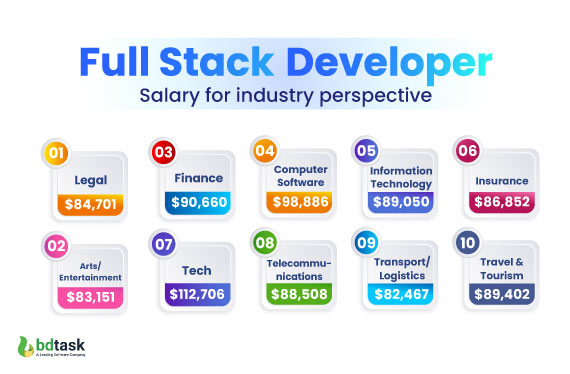
- Legal: $84,701
- Arts/Entertainment: $83,151
- Finance: $90,660
- Computer Software: $98,886
- Information Technology: $89,050
- Insurance: $86,852
- Tech: $112,706
- Telecommunications: $88,508
- Transport/Logistics: $82,467
- Travel & Tourism: $89,402
Tips To Increase Your Salary
Some interpersonal skills like that can improve your inside creativity and upgrade from others.
Here we gather some Non-technical skills also known as soft skills. Lets them check out and get some ideas through it.
- Problem-solving
- Creativity
- Written and verbal communication skills
- Knowledge of software development methodologies like CI/CD (continuous integration, continuous delivery), DevOps, and Agile.
12 Personality Traits Of A Full Stack Developer
Full stack developers are the Army of the tech world. They possess many skills, from front-end development to server-side scripting and everything in between. But technical prowess alone isn't enough. The best full stack developers exhibit a blend of skills and traits that go beyond coding. How to be a full stack developer is your main goal but proper Personality Traits are also important.
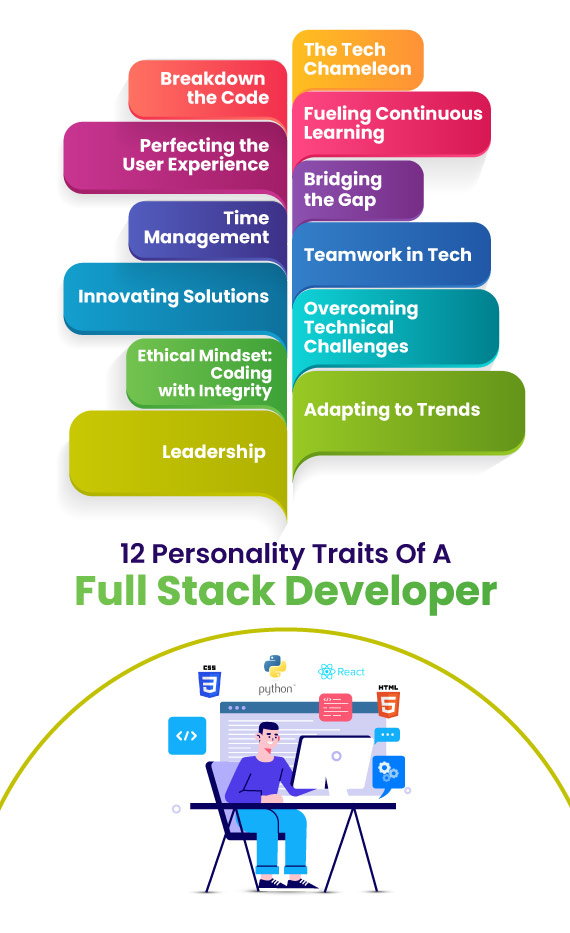
1. The Tech Chameleon
In the rapidly evolving tech landscape, flexibility is key. Full stack developers seamlessly transition between programming languages, frameworks, and tools. Their ability to pivot ensures they can tackle any project with finesse.
2. Breakdown the Code
At the heart of a full stack developer's role lies problem-solving. They relish dissecting complex challenges and devising elegant solutions. Whether debugging code or optimising performance, their analytical minds excel in untangling intricate issues.
3. Fueling Continuous Learning
The tech world is a bottomless pit of knowledge, and full stack developers possess an insatiable curiosity. They embrace learning opportunities, from mastering new programming languages to exploring emerging trends, ensuring they stay at the forefront of innovation.
4. Perfecting the User Experience
Creating seamless user experiences requires acute attention to detail. Full stack developers meticulously craft interfaces that are intuitive and visually appealing. A full stack developer understands that even the smallest details can significantly affect user satisfaction.
5. Bridging the Gap
Technical prowess loses its impact without effective communication. Full stack developers bridge the gap between technical jargon and plain language, ensuring everyone understands project goals and progress, from clients to team members.
6. Time Management
In a dynamic tech environment, time is of the essence. Full stack developers excel at managing their time efficiently, juggling multiple projects and tasks without sacrificing quality.
7. Teamwork in Tech
Tech projects are rarely solo endeavors. Full stack developers thrive in collaborative environments, valuing input from designers, back-end developers, and other team members to create cohesive and successful products.
8. Innovating Solutions
Coding is often called an art form; full stack developers embrace their creative sides. They find innovative ways to solve problems.
9. Overcoming Technical Challenges
Bugs, errors, and setbacks are par for the course in software development. Full stack developers exhibit resilience, using every challenge as an opportunity to learn and refine their skills.
10. Ethical Mindset: Coding with Integrity
Ethics matter in every field, and full stack developers are no exception. The code, with integrity, prioritises security, privacy, and user well-being in every line of code they write.
11. Adapting to Trends
Technology trends come and go, but full stack developers remain adaptable. They embrace new technologies and techniques, ensuring their skill set is always up-to-date.
12. Leadership
Full stack developers often take on leadership roles in development projects. Their comprehensive understanding of front-end and back-end aspects positions them to guide and mentor others effectively.
Final Thought
Becoming a full stack developer requires dedication, continuous learning, and a passion for technology. By mastering front-end and back-end development, learning about databases, version control, and APIs, and staying updated with the latest trends, you can become a proficient full stack developer and open up a world of exciting career opportunities.
